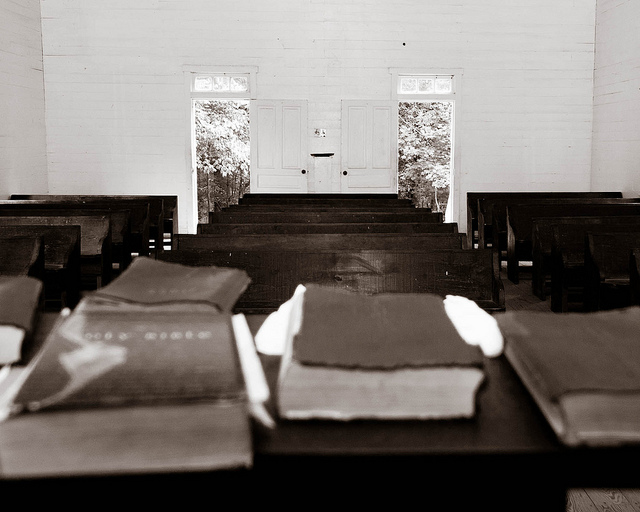Some Thoughts on “Writing People Up”
[NOTE: A few weeks ago, I published a version of the following list on Facebook. It received a lot of attention, but I pulled it down due to some people taking over the comments. What follows is a slightly edited version (for grammar, not for content) of that post that I hope will make us all think. –Adam]

Over the past year or so, I have seen a lot of posts by a lot of people condemning brothers in Christ by name; including large numbers who are not even at the same congregation. For some time, I have avoided calling names in the pulpit, in our bulletin, etc. I am not saying it is a sin to do so, but here are six reasons why I have refrained:
- If it is someone who is not a member where I preach, our congregation is autonomous, and so is theirs. While I may think I know what is going on, I am not his elder (I’m not an elder to start with!), so I have no authority over him (nor him over me). My responsibility is to Christ and to my elders and church family…period.
- I care far more deeply about the church than to run it through the mud in public, unless absolutely necessary. Yes, I have written open letters (actually, just one) to specific congregations. Maybe I should not have, but in that instance, the congregation was publicizing widely something that is wrong. When I start talking about this preacher or that eldership in public, how does that help the world’s perception of the precious Bride of Christ?
- When Paul had a disagreement with Cephas (Peter), the opposition was done “to his face” (Galatians 2:11). Putting something on Facebook or Twitter without going to someone face-to-face is cowardly and runs counter to the principles set forward in Matthew 18:15-20 and elsewhere.
- Frankly, I do not have time to police the brotherhood. Yes, I know of issues (more than I want to know, honestly). Yes, I know of people who are preaching falsely on various issues. Yes, I know of congregations that are doing things that concern me. But I do not have time to go to all these places and check the facts for myself. I have a congregation here who needs to hear the truth, who needs someone to encourage them in their lives, who needs to help shine the light of Christ in this community, and who needs a preacher who spends time with his own family. That’s what I need to spend my time involved in; not trying to monitor everyone else.
- That whole “golden rule” thing comes to mind. If I appeared on a lectureship with someone whom another found to be in error (and I have), or even if I personally preached something that was incorrect, would I want someone’s first instinct to be to “write me up” on Facebook or in a church bulletin? Of course not! I would much rather someone lovingly approach me with the Bible and help me see the truth more accurately. “Speaking the truth in love” still sounds like a wonderful way to take care of issues. Letting our speech be “with grace” and “seasoned with salt” is needed, too.
- Finally, I have not mentioned men by name in sermons simply because I am trying to show people issues that are right and wrong; not people who are right and wrong. I would far rather show someone that Jesus, Paul, Peter, and John make it clear that baptism is essential for salvation than point them to some other so-called “authority” who says it is not. I can expose a false teaching without having to rake a false teacher over the coals—especially one I have never taken the time to speak to personally about the matter.
Yes, we must deal with false teachers, but maybe we need to spend time in our prayer closets first. Then, maybe we need to deal with them lovingly and face-to-face, instead of trying to shame them on our own personal platforms.
With that in mind, here are some objections that I would like to address as well.
- Isn’t this post hypocritical? In other words, aren’t I finding fault when I’m telling others not to. I fully recognize there could be some irony in this post, but notice that I did not call names and did my best to simply point out an issue for us all–myself included–to consider.
- Yes, I know that Paul and others “called names.” But Paul was inspired to do so, and I am not.
- We are told to “mark” others “who cause divisions and create obstacles” (Romans 16:17). Is it not possible, though, that Paul was telling the church at Rome to mark those people who were doing that in their own congregation and not somewhere else?
Again, I am not saying it is a sin to mention names. I have friends who do, and I do not condemn them for it. I would venture to say that there is a good chance one of these days I might find it necessary to do so.
So far in my ministry, though, I have avoided such, and I hope the reasons listed above will cause us all to think before we decide to talk about someone–especially someone we’ve never or rarely even met–by writing them up. In our sermons, our classes, our bulletins, and (yes) on our Facebook walls, let’s shine the light of Christ and do our best to talk about issues and doctrines, not people and personalities.
To Receive Every Post from A Legacy of Faith through Email for Free, Click Here
AUTHOR: Adam Faughn


